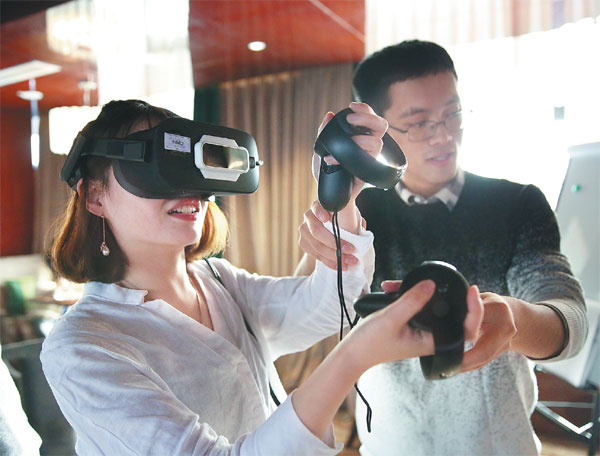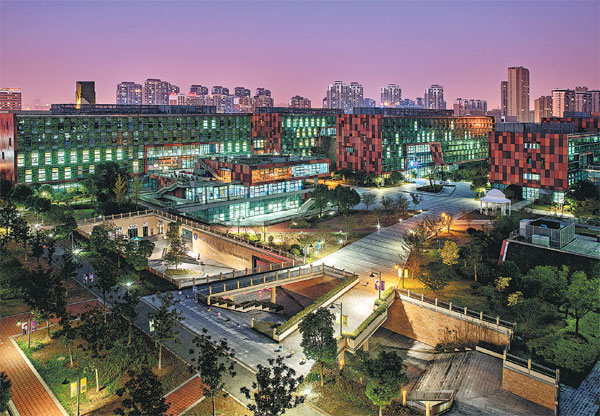Dynamic educational institution explores cutting-edge realm of AI
University's innovative programs focus on entrepreneurship, leadership and problem-solving skills
Xi'an Jiaotong-Liverpool University in Suzhou, Jiangsu province, is incorporating the field of artificial intelligence into its innovative teaching plan.
Over the past two years, XJTLU, which was founded in 2006 by Xi'an Jiaotong University in Shaanxi province and the University of Liverpool in the United Kingdom, has striven to create a new model of "Syntegrative Education", a name given by the university to describe its program of cultivating future industry-focused experts and leaders.
Xi Youmin, executive president of XJTLU, said Syntegrative Education focuses on providing not only a quality or general education, but also industry knowledge, management ability, cross-cultural leadership and entrepreneurship.
|
Students at Xi'an Jiaotong-Liverpool University practice using virtual reality equipment. Photos Provided to China Daily |
"The global network and the pace of technological change have led to the evolution of traditional education," he said, adding that universities are no longer simply offering students existing knowledge but focusing on their abilities to keep learning throughout their lives.
The Syntegrative Education model can be broken down into three types: The "Industry and Enterprise Tailored Education" program created last year and two upcoming models - "Entrepreneur College" and "Innovation and Entrepreneurship Community" - that will be developed by faculty, working hand-in-hand with enterprises and local government.
The Industry and Enterprise Tailored Education model enables students to pick a course as the degree program and work together with high-potential enterprises to learn industry knowledge through related courses designed by the sector insiders. The students will be trained in the real business context in courses taught jointly by university professors and those insiders.
Beijing-based high-tech company Sugon Information Industry is among the companies joining hands with XJTLU, setting up several practice courses to develop experts in big data, cloud computing and AI technology.
"AI is related more to practice than theory, and it has created a high demand for computing ability," said Song Huaiming, chief engineer of the big data and innovation department at the company.
"Enterprises require students to master enough knowledge and apply it to practice," he said. "The university's theoretical courses can complement our strengths."
Huang Kaizhu, head of the department of electrical and electronic engineering at XJTLU, added, "This is an era of information explosion that allows students to access a huge amount of knowledge."
AI's highest use, Huang said, is to assist people in making decisions and solving emerging problems; "thus, we have to cultivate students' abilities to collect information and explore problem-solving."
Along with the idea of research-led education, the university has established learning resources such as diverse online courses and sophisticated laboratories.
According to Huang, XJTLU has adopted the method of free learning, whereby teachers assign a topic that requires students to look for information first and then discuss it with teachers.
"The ability to solve problems is crucial in the era of AI, and we want to use this kind of teaching method to inspire the students' research spirit and improve their algorithm ability to adapt to the world's needs," Huang said.
Syntegrative Education is also being applied to the university's graduate studies.
Eng Gee Lim, dean of research and graduate studies at XJTLU, said that at the graduate level, the university will continue to design courses with enterprises with the aim of ensuring students' capability to combine theory with practice.
"Times are changing fast. We need to integrate expertise, industry knowledge and entrepreneurship into education, thus shortening the adaptive period for students from campus to society," Lim said.
He added that education should be forward-looking and train students to not just learn but create, thus preparing them for a fast-paced society in the future.
In February, XJTLU announced its plan to build a new campus in the city of Taicang in southeast Jiangsu province, focusing on deepening Syntegrative Education through cooperation among the university, businesses and local communities.
The campus will set up schools with industry partners in intelligent robotics, internet of things, AI and advanced computing, intelligent manufacturing ecosystems, culture and arts technology, industrial internet and financial integration.
The planned campus will cover an area of 1 million square meters with student enrollment beginning in 2019. By 2025, it is expected to accommodate more than 5,000 students, according to the university.
liangkaiyan@chinadaily.com.cn
|
Xi'an Jiaotong-Liverpool University in Suzhou, Jiangsu province, is founded in 2006 by Xi'an Jiaotong University in Shaanxi province and the University of Liverpool in the UK. |
(China Daily 06/27/2018 page19)
















